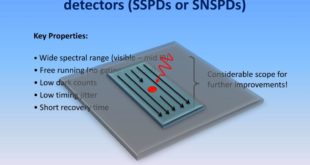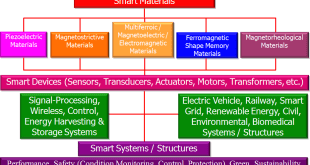The human body is electric. Peripheral nerves connect all organs to the central nervous system, and those nerves are packaged in various bundles. The vagus nerve, for example, carries about 100,000 nerve fibers. It’s also the longest nerve in the body, linking the brain to organs from the esophagus to …
Read More »Countries building Artificial islands for economic progress, establishing industry,and exerting geopolitical and military control
An artificial island or man-made island is an island that has been constructed by people rather than formed by natural means. Artificial islands may vary in size from small islets reclaimed solely to support a single pillar of a building or structure, to those that support entire communities and cities. Human-made …
Read More »Printed and flexible electronics (PFE) revolution require Smart manufacturing concepts and printing technologies
While the conventional electronics like computers and smartphones is built around silicon integrating billions of transistors and is manufactured using complex, costly and wasteful processes in multi-billion dollar foundries . The printed and flexible electronics aim to replace this by “organic” semiconductors which are long chains of thousands of repeating …
Read More »Military requires Printed and flexible electronics (PFE) and Hybrid Systems enabling Internet of Things, Sensors on Aircrafts, to soft robotic exoskeletons
While the conventional electronics like computers and smartphones is built around silicon integrating billions of transistors and is manufactured using complex, costly and wasteful processes in multi-billion dollar foundries , The printed and flexible electronics aim to replace this by “organic” semiconductors which are long chains of thousands of repeating …
Read More »DARPA’s LUMOS to develop Photonic integrated circuits (PICs) and photonics platforms for defence applications
Photonics is a breakthrough technology as it uses photons (smallest unit of light) as the data carrier instead of electrons (smallest unit of electricity) used in electronic ICs. As light travels at very high speeds, photonics is widely used to transfer huge amounts of data at a very high speed. …
Read More »DARPA’s DETECT developed Single photon detector (SPD) for quantum computers, communications, and submarine detection
The process of detecting light—whether with our eyes, cameras or other devices—is at the heart of a wide range of civilian and military applications, including light or laser detection and ranging (LIDAR or LADAR), photography, astronomy, quantum information processing, medical imaging, microscopy and communications, including underwater Blue-Green communications. Detection of …
Read More »Rising Merger mania, less spending on R&D driving Pentagon, defense contractors out of step on technology research and innovation
In 2018, the Department of Defense (DOD) concluded that technology advancements among potential adversaries posed growing challenges to U.S. defense capabilities, putting U.S. battlefield superiority at risk. In this environment, DOD has renewed its efforts to foster innovation and secure technological supremacy. In response , the Pentagon’s undersecretary for …
Read More »Navies testing Augmented-Reality(AR) systems onboard Warships for battlesace situation awareness, combat training and remote maintenance
Military operations are becoming increasingly diverse in their nature. To cope with new and more demanding tasks, the military has researched new tools for use during operations and during training for these operations. There have been numerous goals driving this research over the past several decades. Many of the military …
Read More »New Smart and multifunctional materials and technologies for Intelligent future, Automotive, Robotics, Aerospace and Defence Industry
Smart materials or Active materials or Functional materials are designed materials that have diverse, dynamic features that enable them to adapt to the environment. They have one or more properties that can be significantly changed in a controlled fashion by external stimuli, the stimulus and response may be mechanical, electrical, …
Read More »Quantum Hyper Entanglement is a key enabler for high-capacity quantum communications, teleportation, processing and imaging
The extraordinary promise of quantum technology—depend on quantum “entanglement,” in which the physical states of two or more objects such as atoms, photons or ions become so inextricably connected that the state of one particle can instantly influence the state of the other—no matter how far apart they are. Today, …
Read More » International Defense Security & Technology Your trusted Source for News, Research and Analysis
International Defense Security & Technology Your trusted Source for News, Research and Analysis









